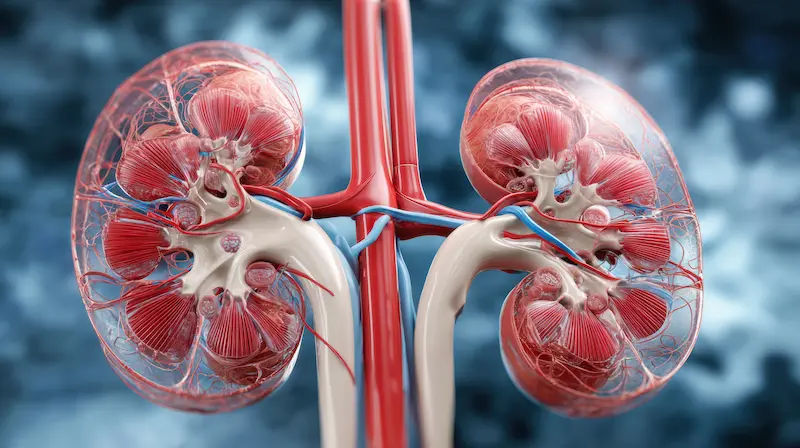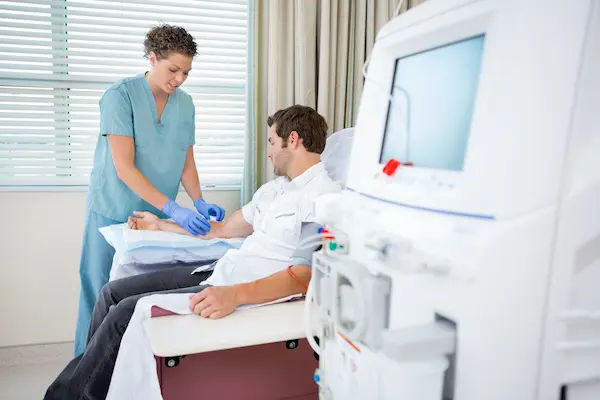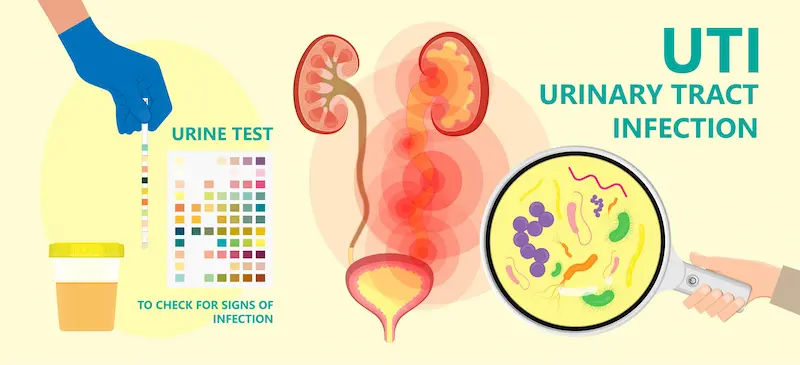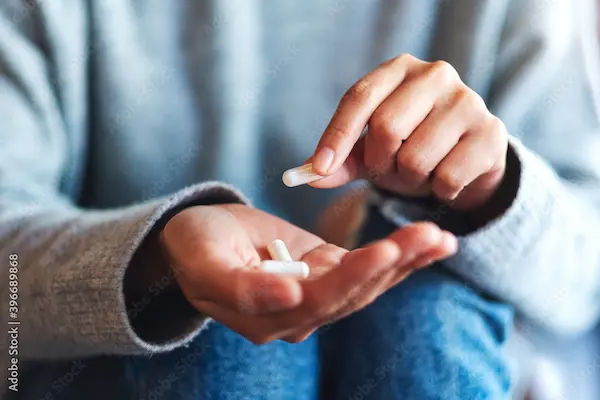10 Simple Daily Habits for Healthy Kidneys
Learn about the simple daily habits to ensure kidney health, staying hydrated, the role of medication and dietary changes.

Written by Dr. Dhankecha Mayank Dineshbhai
Reviewed by Dr. Mohammed Kamran MBBS, FIDM
Last updated on 12th Sep, 2025

Introduction
Your kidneys are the unsung heroes of your body, working tirelessly 24/7 to filter waste, regulate fluid balance, and control blood pressure. Yet, we often take these two bean-shaped organs for granted until a problem arises. Kidney disease is notoriously a "silent" condition, with symptoms often appearing only after significant damage has occurred. The good news? Protecting your kidney health doesn't require drastic measures. This guide will walk you through simple, powerful daily habits from what you drink to how you move that can significantly support your kidneys' vital work and ensure they stay healthy for years to come.
Hydration: The Cornerstone of Kidney Health
Water is essential for your kidneys to function correctly. It helps dissolve waste products and flush them out through urine. Chronic mild dehydration can put a strain on your kidneys and increase the risk of kidney stones and urinary tract infections (UTIs), which can sometimes lead to kidney damage if they spread.
Aim to drink enough fluid so that your urine is light yellow or clear. While the old "8 glasses a day" rule is a good starting point, individual needs vary based on climate, activity level, and overall health.
Consult a Nephrologist for Personalised Advice
How Much Water Do You Really Need?
A more personalised approach is to listen to your body. Drink when you're thirsty. If you exercise vigorously or live in a hot climate, you'll need more. Foods like watermelon, cucumber, and oranges also contribute to your fluid intake. For most healthy adults, drinking when thirsty is a reliable guide.
Signs of Dehydration to Watch For
Dark yellow urine, infrequent urination, dry mouth, and feeling dizzy or lightheaded are classic signs. If you frequently experience these, make a conscious effort to increase your fluid intake throughout the day.
Fuel Your Body, Protect Your Kidneys: Dietary Choices
What you eat directly impacts your kidneys' workload. A kidney-healthy diet is, in many ways, just a heart-healthy and balanced diet.
The Sodium and Blood Pressure Connection
High sodium intake is a primary driver of high blood pressure (hypertension), which is a leading cause of kidney disease. Processed foods, canned soups, restaurant meals, and packaged snacks are often loaded with sodium. Cooking at home using fresh herbs, spices, and lemon juice instead of salt is one of the best kidney-friendly diet choices you can make.
The Power of Plant-Based Foods
Incorporate more fruits, vegetables, and whole grains. These foods are naturally lower in sodium, are anti-inflammatory, and provide essential fibre and antioxidants. The DASH (Dietary Approaches to Stop Hypertension) diet is often recommended for its proven benefits for both blood pressure and renal health.
Limiting Processed Foods and Phosphorus Additives
Processed foods often contain phosphorus additives, which are more easily absorbed by the body than natural phosphorus (found in proteins and dairy). High blood phosphorus levels can leach calcium from your bones and deposit it in blood vessels and kidneys, causing damage. Reading labels to avoid ingredients with "PHOS" is a simple habit for kidney health.
Know Your Numbers: Monitoring Key Health Metrics
Two of the biggest threats to your kidneys are conditions you might already have without knowing: high blood pressure and diabetes.
Blood Pressure: The Silent Kidney Killer
High blood pressure damages the delicate blood vessels in the kidneys, impairing their filtering ability. Know your blood pressure numbers. A consistent reading above 120/80 mm Hg is a reason to discuss lifestyle changes with your doctor. If your blood pressure remains high despite lifestyle changes, consistent medication is crucial. If you struggle to manage your blood pressure, consult a doctor online with Apollo24|7 to create a personalised management plan.
Blood Sugar: Managing Diabetes for Kidney Sake
High blood sugar levels also damage the kidney blood vessels over time. Diabetic nephropathy is a common complication of diabetes. If you have diabetes, carefully managing your blood sugar through diet, exercise, and medication as prescribed is one of the most effective ways to prevent kidney damage.
Be Mindful of Medications: Common Threats to Kidney Health
Your kidneys filter everything in your bloodstream, including medications.
The Danger of Over-the-Counter Painkillers
Nonsteroidal anti-inflammatory drugs (NSAIDs) like ibuprofen and naproxen are notorious for their potential to cause kidney damage, especially if used frequently, in high doses, or by those with pre-existing kidney issues. Use them sparingly and never exceed the recommended dose. Acetaminophen (paracetamol) is generally a safer choice for occasional pain, but always check with a doctor for chronic issues.
The Importance of Regular Check-Ups and Screening
You can't feel early kidney disease. That's why screening is vital, especially if you have risk factors like high blood pressure, diabetes, a family history of kidney disease, or are over 60.
Simple Tests That Can Save Your Kidneys
Two simple tests can detect early signs of trouble:
1. A urine test (ACR): Checks for albumin, a type of protein that shouldn't be there. Its presence (proteinuria) is an early sign of kidney damage.
2. A blood test (eGFR): Estimates your glomerular filtration rate, showing how well your kidneys are filtering waste.
Apollo24|7 offers convenient home collection for these crucial kidney function tests, making it easy to stay on top of your health.
Listen to Your Body: Recognising Early Warning Signs
While often silent, being aware of potential symptoms of kidney problems is important. See a doctor if you experience:
- Fatigue, trouble sleeping, and lack of energy.
- Swelling in the ankles, feet, or around the eyes.
- Puffiness, especially around the eyes.
- Changes in urine frequency, colour, or foaming.
- Persistent itching.
Conclusion
Protecting your kidneys isn't about a single grand gesture but about the small, consistent choices you make every day. From choosing a glass of water over a sugary drink to adding an extra vegetable to your meal or taking a short walk, each positive habit adds a layer of defense for these vital organs. By understanding the risks, adopting these simple lifestyle changes, and staying proactive with your health screenings, you empower yourself to maintain excellent kidney function. Your future self will thank you for the care you start today. Begin by picking one or two habits from this list to focus on this week.
Consult a Nephrologist for Personalised Advice
Consult a Nephrologist for Personalised Advice

Dr. Manju Kamal
Nephrologist
12 Years • MBBS,MD(General Medicine), DNB,DM(Nephrology)
Angamaly
Apollo Hospitals Karukutty, Angamaly

Dr. Kity Sarkar
Nephrologist
15 Years • MBBS,MD(Genl. Med.), DrNB(NEPHROLOGY)
Kolkata
Dr. Kity Sarkar's Clinic, Kolkata

Dr. Pardha Saradhi
Nephrologist
9 Years • MBBS, MD-DNB (Gen. Med.), DNB (Nephro)
Hyderabad
Apollo Hospitals D R D O kanchanbagh, Hyderabad
(75+ Patients)
Dr Ch Sashidhar
Nephrologist
20 Years • MBBS, MD General Medicine, DNB, Nephrology
Secunderabad
Apollo Hospitals Secunderabad, Secunderabad

D. Akshay Zalavadiya
Nephrologist
3 Years • MBBS, MD, DM Nephrology
Ahmedabad
Beacon kidney consult, Ahmedabad
Consult a Nephrologist for Personalised Advice

Dr. Manju Kamal
Nephrologist
12 Years • MBBS,MD(General Medicine), DNB,DM(Nephrology)
Angamaly
Apollo Hospitals Karukutty, Angamaly

Dr. Kity Sarkar
Nephrologist
15 Years • MBBS,MD(Genl. Med.), DrNB(NEPHROLOGY)
Kolkata
Dr. Kity Sarkar's Clinic, Kolkata

Dr. Pardha Saradhi
Nephrologist
9 Years • MBBS, MD-DNB (Gen. Med.), DNB (Nephro)
Hyderabad
Apollo Hospitals D R D O kanchanbagh, Hyderabad
(75+ Patients)
Dr Ch Sashidhar
Nephrologist
20 Years • MBBS, MD General Medicine, DNB, Nephrology
Secunderabad
Apollo Hospitals Secunderabad, Secunderabad

D. Akshay Zalavadiya
Nephrologist
3 Years • MBBS, MD, DM Nephrology
Ahmedabad
Beacon kidney consult, Ahmedabad
More articles from Kidney Disease
Frequently Asked Questions
What are the first signs of kidney problems?
Early signs can be subtle and include fatigue, difficulty concentrating, poor appetite, trouble sleeping, puffiness around the eyes, swollen feet/ankles, and changes in urine output or frequency. However, kidney disease is often silent, which is why screening is key.
How can I improve my kidney function naturally?
The best natural ways to support your kidneys are the foundational habits: staying well-hydrated with water, eating a balanced diet low in processed foods and sodium, maintaining a healthy weight through regular exercise, and avoiding substances like excessive NSAIDs and tobacco.
What drinks are best for flushing the kidneys?
Water is the absolute best drink for kidney health. Herbal teas like dandelion root or nettle leaf are sometimes suggested, but plain water is most effective and safest. It's crucial to avoid sugary sodas and high-sugar juices, as they can contribute to diabetes and obesity, which are risk factors for kidney disease.
Can damaged kidneys heal?
Kidneys have a limited ability to repair themselves. The focus is on preventing further damage. By controlling the underlying cause (e.g., managing blood pressure and diabetes), you can often slow or even stop the progression of kidney disease, preserving remaining function.
How often should I get my kidneys checked?
If you have no risk factors, a check during your annual physical is reasonable. If you have high blood pressure, diabetes, heart disease, a family history of kidney failure, or are over 60, you should get tested (blood and urine) at least once a year, or as recommended by your doctor.




_5.webp)